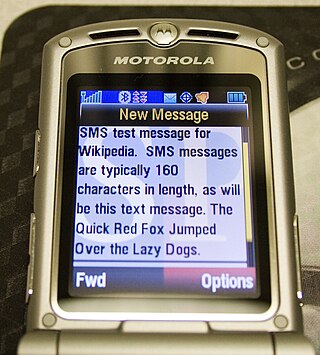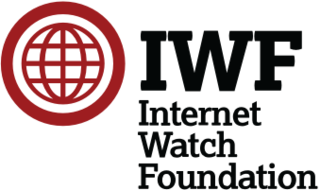
Short Message Service, commonly abbreviated as SMS, is a text messaging service component of most telephone, Internet and mobile device systems. It uses standardized communication protocols that let mobile phones exchange short text messages, typically transmitted over cellular networks.
The Universal Mobile Telecommunications System (UMTS) is a 3G mobile cellular system for networks based on the GSM standard. Developed and maintained by the 3GPP, UMTS is a component of the International Telecommunication Union IMT-2000 standard set and compares with the CDMA2000 standard set for networks based on the competing cdmaOne technology. UMTS uses wideband code-division multiple access (W-CDMA) radio access technology to offer greater spectral efficiency and bandwidth to mobile network operators.
Telecommunications in Austria encompass highly developed and efficient internet and telephone networks, complemented by a number of radio and television broadcast stations.

Roaming is a wireless telecommunication term typically used with mobile devices, such as mobile phones. It refers to a mobile phone being used outside the range of its native network and connecting to another available cell network.

The International Mobile Equipment Identity (IMEI) is a numeric identifier, usually unique, for 3GPP and iDEN mobile phones, as well as some satellite phones. It is usually found printed inside the battery compartment of the phone but can also be displayed on-screen on most phones by entering the MMI Supplementary Service code *#06# on the dialpad, or alongside other system information in the settings menu on smartphone operating systems.
The Australian Communications and Media Authority (ACMA) is an Australian government statutory authority within the Communications portfolio. ACMA was formed on 1 July 2005 with the merger of the Australian Broadcasting Authority and the Australian Communications Authority.
Internet censorship in Australia is enforced by both the country's criminal law as well as voluntarily enacted by internet service providers. The Australian Communications and Media Authority (ACMA) has the power to enforce content restrictions on Internet content hosted within Australia, and maintain a blocklist of overseas websites which is then provided for use in filtering software. The restrictions focus primarily on child pornography, sexual violence, and other illegal activities, compiled as a result of a consumer complaints process.
The Open Mobile Terminal Platform (OMTP) was a forum created by mobile network operators to discuss standards with manufacturers of mobile phones and other mobile devices. During its lifetime, the OMTP included manufacturers such as Huawei, LG Electronics, Motorola, Nokia, Samsung and Sony Ericsson.

Wireless Application Protocol (WAP) is a now obsolete technical standard for accessing information over a mobile cellular network. Introduced in 1999, WAP allowed at launch users with compatible mobile devices to browse content such as news, weather and sports scores provided by mobile network operators, specially designed for the limited capabilities of a mobile device. The Japanese i-mode system offered another major competing wireless data standard.
Internet censorship in the United Kingdom is conducted under a variety of laws, judicial processes, administrative regulations and voluntary arrangements. It is achieved by blocking access to sites as well as the use of laws that criminalise publication or possession of certain types of material. These include English defamation law, the Copyright law of the United Kingdom, regulations against incitement to terrorism and child pornography.

Video Share is an IP Multimedia System (IMS) enabled service for mobile networks that allows users engaged in a circuit switch voice call to add a unidirectional video streaming session over the packet network during the voice call. Any of the parties on the voice call can initiate a video streaming session. There can be multiple video streaming sessions during a voice call, and each of these streaming sessions can be initiated by any of the parties on the voice call. The video source can either be the camera on the phone or a pre-recorded video clip.
Rich Communication Services (RCS) is a communication protocol standard for instant messaging, primarily for mobile phones, developed and defined by the GSM Association (GSMA). It aims to be a replacement of SMS and MMS on cellular networks with more modern features including high resolution image and video support, typing indicators, file sharing, and improved group chat functionality. As for MMS, mobile service must be activated. Development of RCS began in 2007 but early versions lacked features and interoperability; a new specification named Universal Profile was developed and has been continually rolled out since 2017.

IP exchange or (IPX) is a telecommunications interconnection model for the exchange of IP based traffic between customers of separate mobile and fixed operators as well as other types of service provider, via IP based Network-to-Network Interface. IPX is developed by the GSM Association.
The Internet in Kazakhstan is growing rapidly. Between 2001 and 2005, the number of Internet users increased from 200,000 to 1 million. By 2007, Kazakhstan reported Internet penetration levels of 8.5 percent, rising to 12.4 percent in 2008 and 34.3% in 2010. By 2013, Kazakhstani officials reported Internet penetration levels of 62.2 percent, with about 10 million users. There are five first-tier ISPs with international Internet connections and approximately 100 second-tier ISPs that are purchasing Internet traffic from the first-tier ISPs. As of 2019, more than 75% of Kazakhstan's population have access to the internet, a figure well ahead of any other country in Central Asia. The Internet consumption in the country rose from 356 PB in 2018 to 1,000 PB in 2022.

The Internet Watch Foundation (IWF) is a global registered charity based in Cambridge, England. It states that its remit is "to minimise the availability of online sexual abuse content, specifically child sexual abuse images and videos hosted anywhere in the world and non-photographic child sexual abuse images hosted in the UK." Content inciting racial hatred was removed from the IWF's remit after a police website was set up for the purpose in April 2011. The IWF used to also take reports of criminally obscene adult content hosted in the UK. This was removed from the IWF's remit in 2017. As part of its function, the IWF says that it will "supply partners with an accurate and current URL list to enable blocking of child sexual abuse content". It has "an excellent and responsive national Hotline reporting service" for receiving reports from the public. In addition to receiving referrals from the public, its agents also proactively search the open web and deep web to identify child sexual abuse images and videos. It can then ask service providers to take down the websites containing the images or to block them if they fall outside UK jurisdiction.
The GSM Association is a non-profit industry organisation that represents the interests of mobile network operators worldwide. More than 750 mobile operators are full GSMA members and a further 400 companies in the broader mobile ecosystem are associate members.
Internet censorship in South Africa is a developing topic.
OneAPI is a set of application programming interfaces (APIs) supported by the GSM Association that exposes network capabilities over the Internet.
The precise number of websites blocked in the United Kingdom is unknown. Blocking techniques vary from one Internet service provider (ISP) to another with some sites or specific URLs blocked by some ISPs and not others. Websites and services are blocked using a combination of data feeds from private content-control technology companies, government agencies, NGOs, court orders in conjunction with the service administrators who may or may not have the power to unblock, additionally block, appeal or recategorise blocked content.
The child abuse image content list is a list of URLs and image hashes provided by the Internet Watch Foundation to its partners to enable the blocking of child pornography & criminally obscene adult content in the UK and by major international technology companies.






